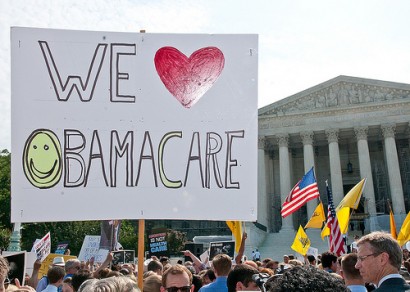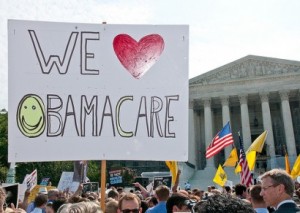Latinos: Healthcare not Immigration Made 2012 Difference

 By Curt Warner, Voxxi
By Curt Warner, Voxxi
By any measure, this past year was a momentous one in terms of both healthcare policy in the abstract and in a more practical sense for its evolving impact on our daily lives. That the U.S. Supreme Court reaffirmed the constitutionality of the Affordable Care Act of 2010, a.k.a. Obamacare, and a general election which made it clear that a majority of U.S. voters approve the first national healthcare plan in history, cements a healthcare policy that was envisioned by presidents starting with Nixon and continuing on a somewhat jagged line to Clinton.
Now that the judicial and political smoke has cleared and we’re edging close to 2013, it’s a good time to review what we have and where we’re headed for the coming year in terms of healthcare.
 VOXXI spoke with two leaders who have some definite ideas, one an influential Congressman who voted for the Affordable Care Act and one, from academia, who lectures about it.
VOXXI spoke with two leaders who have some definite ideas, one an influential Congressman who voted for the Affordable Care Act and one, from academia, who lectures about it.
U.S. Rep. Xavier Becerra, a Democrat whose ethnic-rich 31st District spans Los Angeles and who is a force in national politics since his initial election to the House of Representatives in 1992. Today, he serves as vice chair of the House Democratic Caucus and as a senior member of the powerful Committee on Ways and Means which is responsible for formulating tax, Social Security, Medicare, trade and income security laws.
Dr. Gabriel Sanchez, Associate Professor of Political Science at the University of New Mexico and a key thought leader on racial and ethnic politics with a focus on Latino political behavior. Dr. Sanchez is also Director of Research for Latino Decisions, a survey firm focused on the Latino population.
In 2012, Democrats and president Barack Obama finally embraced Obamacare, a term that had been viewed as a derogatory one for the Affordable Care Act. In the next few years the key provisions of this health law will take effect.
Rep. Becerra, who voted for the bill, is more than pleased.
“Latinos work hard to earn their money and healthcare reform helps give them a better chance to make progress,” he said. “Because of Obamacare, Latinos won’t have to go through personal bankruptcy if their children get sick or go to the emergency room for care. Latinos helped re-elect the president and said they believe in him and want to continue to believe in what I call the Aspiring Class of Americans, which are those who are not quite in the middle class but still aspire to the American dream.”
Indeed, Latino voters turned out in enormous numbers for the recent presidential election and by a huge 44 percent margin helped send President Obama back to the White House.
Because Latinos are more likely than any other group to be uninsured, Dr. Sanchez believes that Obamacare played a critical role in garnering Latino support.
In 2012, Democrats and president Barack Obama finally embraced Obamacare, a term that had been viewed as a derogatory one for the Affordable Care Act. In the next few years the key provisions of this health law will take effect. (Photo-OECD)
“We didn’t get immigration reform but this (healthcare reform) makes a big difference. Now, the president must show evidence that the ACA is being implemented,” he said. ”Especially in parts of California and Texas, how that message will resonate through people’s lives is extremely important. For Latinos, in the context of healthcare, it’s all about personal finances and that issue will continue for voters through 2014 and 2016. Latinos’ patience won’t be as long as the president might like.”
However, Sanchez cautions that since the Latino population is so young and growing so fast—an estimated 50,000 Hispanic teens reach voting age every month—healthcare reform might not remain the big issue it is in coming years.
Sanchez points out that the youngest segment does not go to the polls as regularly as the older Latino electorate. “The young can now stay on their parents’ plans and so in a sense are least likely to feel the benefit from Obamacare because they never experienced the worry of not having insurance.”
On the other hand, Rep. Becerra is a believer in what you might call neighborhood power.
“Latinos and other voters overcame the cynicism that Republicans tried to inject during the campaign and those who remain on their parents’ policy now talk to their peers about healthcare. Latino seniors now talk to their friends and neighbors about the free mammograms they are getting,” he said. In that way, word is spread about the value of healthcare reform on a personal level and in a political sense about the job that Democrats and the president have done.
Becerra had strong words of warning for mostly Republican governors who decline to set up state-run healthcare exchanges and double down in their obstructionist philosophy by rejecting federal funding for the Medicaid expansion called for under Obamacare but made voluntary by the Supreme Court.
“Governors who disrespect their citizens and ignore their needs will hear from citizens who see their neighbors work hard and still don’t qualify for healthcare insurance,” he told VOXXI. “Those governors don’t care about people who can’t afford healthcare insurance. These folks work or else they would be getting Medicaid. It’s foolish and cruel to make people use the emergency room for care because it makes everyone pay more.”
Republican governors and state legislatures have been slow to fund and develop the health insurance exchanges that would help a segment of citizens shop for lower cost/ higher quality healthcare insurance. This appears to be behavior for a group that ideologically believes that laws and regulations should go through the states, not the federal government.
Yet through this week, just 17 states have signaled their intent to run their own exchanges, which forces federal authorities to run the exchanges for them. This small number could hamper efforts to lower rates since it limits the number of healthy people in the pool.
As part of Obamacare, the exchanges are online supermarkets where people can shop for private health insurance and obtain federal subsidies to help defray costs. Estimates are that 25 million people will eventually receive coverage through the exchanges.
This article was first published in Voxxi.
Curt Werner has covered both the business and clinical sides of healthcare for more than 25 years mostly for trade publications.
[Photo by SEIU International]
